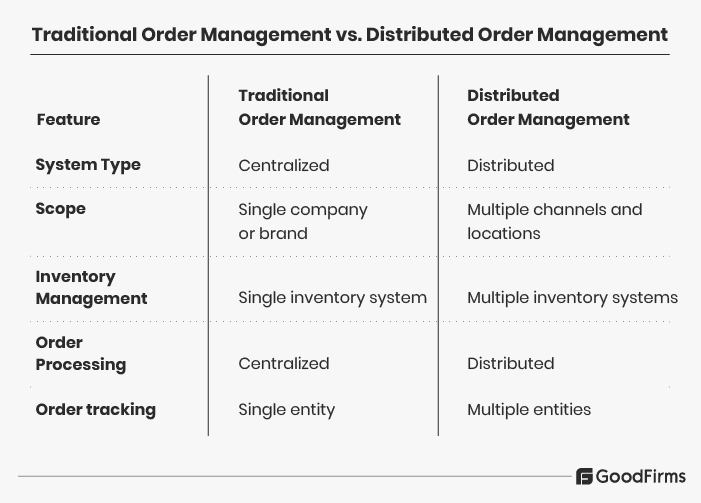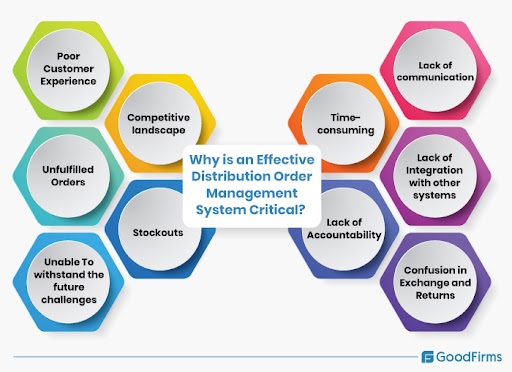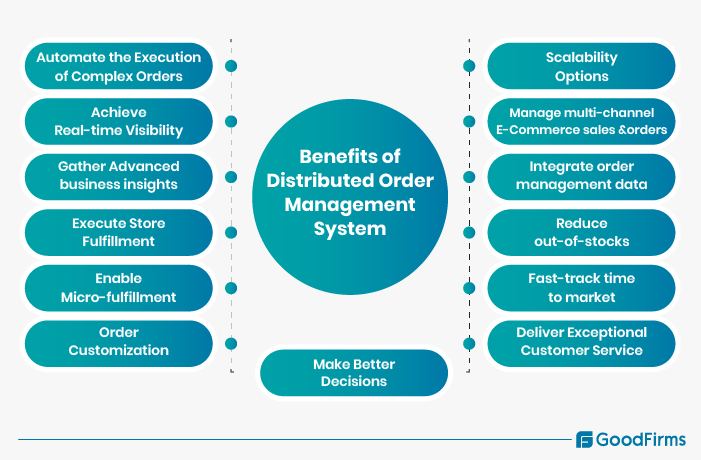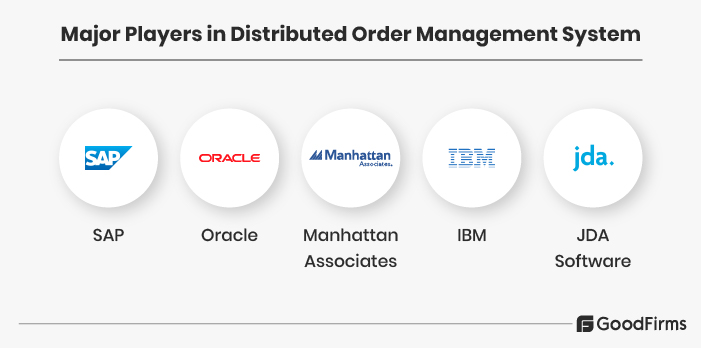In today's fast-paced business environment, companies face new and unprecedented challenges to keep up with the growing customer demands. The popularity of e-commerce and multichannel retail strategies is growing. Due to this, businesses need help managing and fulfilling orders from multiple channels and locations in a seamless manner. They need a comprehensive solution that can handle the complexity of managing orders, inventory, and customer interactions which are crucial for any business to stay competitive.
As customers increasingly expect to be able to shop and purchase goods through multiple channels, businesses are looking for ways to streamline and optimize their order management processes. A solution that can provide a single view of inventory and customer demand across all channels and locations, enabling real-time decisions about inventory allocation and fulfillment, is essential to meet this demand. Such a solution should allow users to efficiently, and automatically manage and execute complex order routing processes in real-time with complete orchestration with the other related systems. A distributed order management system is one such system that can fulfill this task.
This blog will take you through the power of an all-encompassing distributed order management system, and help you realize that the demand for such a system will only increase in the days to come.
Unfolding the Power of Order Management
Order management is the backbone of any successful business. It is the process of tracking, managing, and fulfilling customer orders from start to finish. The power of order management lies in its ability to streamline and optimize the entire order fulfillment process, from inventory management to shipping and delivery. The order management market is expected to cross $2 billion in the upcoming years. This shows that more and more businesses will opt for order management systems to achieve a more competitive edge in the market. With the right order management system in place, businesses can improve their customer service, increase efficiency and ultimately drive growth for their business.
The power of order management cannot be overstated. It is the key to unlocking the full potential of your retail operation. By streamlining and optimizing the entire order fulfillment process, businesses can improve their customer service, increase efficiency, and ultimately drive growth for their businesses. With the right order management system in place, businesses can stay ahead of the competition and meet the ever-changing demands of their customers.
Distributed Order Management: Explained
Distributed order management (DOM) is an end-to-end, comprehensive, and connected retail fulfillment method for omnichannel commerce. It is a game-changing innovation in order management, yet many companies need to be aware of its capabilities. DOM uses order fulfillment or rule-based logic to orchestrate and optimize the order fulfillment process. The goal is to minimize lead times and maximize customer satisfaction while keeping costs low for businesses. The system automates order management processes by handling order routing and fulfilling orders through multiple channels. It is one of the most beneficial features provided by top order management systems.
Distributed order management enables businesses to manage and track orders and inventory across a blend of channels, locations, and warehouses, including e-commerce websites, physical stores, and marketplaces. This system ensures real-time inventory availability and accurate delivery dates for improving customer satisfaction through integrated inventory management software. Distributed order management also optimizes order fulfillment by selecting the best warehouse or distribution center based on inventory levels, shipping costs, and delivery times. This ultimately helps in reducing costs and improving efficiency.
Moreover, DOM allows businesses to have a clear view of inventory levels across different locations, enabling them to reallocate stock as per the requirements quickly. Distributed order management is a must-have system for businesses that operate through multiple channels and store inventory in different locations.
For effective distributed order management, businesses typically need a robust system that can provide real-time visibility into inventory levels and order status across all channels and locations. Additionally, an effective DOM system should easily integrate with other systems, such as e-commerce platforms, shipping software, manufacturing software, barcoding software, warehouse management systems, etc., to ensure accurate and timely information collection.
In addition, DOM also enables businesses to use intelligent algorithms to optimize order routing and inventory allocation between different channels, stores, and warehouses, to minimize the shipping cost and delivery time.
Traditional Order Management vs. Distributed Order Management

Traditional Order Management and Distributed Order Management are two different approaches to managing the supply chain for a business. These two approaches differ from each other in several aspects.
Traditional Order Management refers to the process of managing and processing orders for a single company or brand manually, without the assistance of computer systems. This can include taking orders over the phone or in person, manually tracking inventory levels, manually updating customer information, and manually processing and shipping orders. This process can be time-consuming and error-prone, as it relies on manual data entry and paper-based documentation. This approach is focused on a static and inflexible supply chain that doesn't provide clear insights into supply chain management. Additionally, traditional order management systems are based on on-premises, heavy architecture and are prone to inaccuracies.
On the other hand, online Distributed Order Management allows merchants to source inventory from multiple fulfillment locations and sell through various sales channels. This approach enables a business to ship orders to customers through an omnichannel strategy, including internal warehouses, brick-and-mortar stores, online sales channels, and third-party warehouses.
A Distributed Order Management system is agile and flexible, thanks to its cloud-based infrastructure and web service-based integrations. It provides up-to-date inventory information by sourcing inventory from multiple nodes and allows businesses to place orders with suppliers across multiple platforms. Smaller, more frequent invoices make tracking and managing orders easier, resulting in increased productivity and better customer experience.
Why is an Effective Distribution Order Management System Critical?

An effective distribution order management system is very critical for businesses. It allows businesses to streamline their order fulfillment process, optimize inventory management, and improve customer satisfaction. These are as follows:
Poor Customer Experience
In the last few years, customer satisfaction has fallen to the lowest since 2015. In addition, poor customer service can lead to 73% of customers "ghosting" a brand after three or fewer negative experiences. Therefore, an effective distribution order management system is critical for businesses to provide customers with a seamless and optimized experience. DOMS can automate and streamline different organizational processes that improve coordination and accountability. This leads to a better customer experience.
Competitive Landscape
In a competitive marketplace, companies with more advanced systems in place have an advantage. Having an effective Distribution Order Management System in place can help a company keep up with competitors and even gain market share by providing a better customer experience, reducing errors, and increasing efficiency. In addition, with an effective DOMS, companies can keep an eye on their competitors, which helps attain sustainability in the market.
Unfulfilled Orders
It's become a norm for more than 90% of US online shoppers to expect free two-to-three-day shipping as a standard for deliveries, with an ever-growing 30% now expecting same-day delivery as a part of their online shopping experience. Delay in order fulfillment due to various issues can hamper customer experience. An effective Distribution Order Management System can help prevent unfulfilled orders by providing real-time inventory information, automating the order fulfillment process, and integrating with other systems to ensure that orders can be fulfilled on time and in full.
Unable To Withstand the Future Challenges
The COVID pandemic created deficiencies in supplies resulting in mismanagement of inventories, and deliveries for many businesses. Several companies had to invest in advanced technologies to withstand the challenges. For instance, IKEA, a well-known furniture company, successfully navigated supply chain disruptions and served as an example for others. Their success also emphasized the role of technology in addressing supply chain issues.
IKEA was prepared to withstand unexpected challenges but not all organizations withstand such unexpected future challenges. Whether it is because of needing to be appropriately prepared or a lack of insights, future challenges can adversely influence the growth of any business. An effective Distribution Order Management System can help a company to adapt and grow by providing the scalability and flexibility needed to handle future challenges. It can also provide real-time data and analytics to help identify trends, opportunities, and potential challenges that can be addressed on time.
Stockouts
Stockout is a common challenge for businesses when dealing with products. An effective Distribution Order Management System can help prevent stockouts. This is done by providing real-time inventory information, automating the reordering process, and integrating with other systems to ensure that inventory is replenished as needed.
Time-consuming
E-commerce is projected to make up more than 20% of total retail sales in the upcoming years. However, the current fulfillment infrastructure is only equipped to handle half that volume which is a significant concern for businesses. This can lead to delays in order fulfillment. However, DOMS can resolve this problem. An effective Distribution Order Management System can help reduce the time required to manage orders by automating processes, providing real-time information, and integrating with other systems. This allows employees to focus on other tasks and increases efficiency.
Miscommunication
Traditional order management systems comprised several departments and teams where the miscommunication was common. However, a DOMS consists of multiple functions in a single place which is very helpful in proper communication. An effective Distribution Order Management System can help prevent miscommunication by providing a centralized platform for managing orders, automating processes, and providing real-time information. This helps ensure that all parties involved in the order management process have access to the same information and reduces the chance of errors.
Lack of Integration With Other Systems
An effective Distribution Order Management System can integrate with other systems, such as inventory management, e-commerce platforms, supply chain, warehouse, accounting, invoicing, customer support, etc. This is useful in improving coordination and accountability. This helps ensure that orders are fulfilled on time and in total and can help prevent unfulfilled orders and stockouts.
Confusion in Exchange and Returns
A distributed order management system can eliminate confusion in exchanges and returns by providing a centralized system for tracking and managing orders, inventory, and customer information. This can help to streamline the exchange and return process by providing real-time visibility into inventory levels, order status, and customer information.
Additionally, a DOMS can automate many of the manual tasks associated with exchanges and returns, such as generating return labels and processing refund requests. This can help to reduce errors and improve the overall efficiency of the exchange and return process.
Lack of Accountability
An effective Distribution Order Management System can help increase accountability. This is done by providing real-time information, automating processes, and integrating with other systems. This helps ensure that orders are processed and fulfilled correctly and that any issues can be identified and resolved quickly.
Benefits of Distributed Order Management System

Automate the Execution of Complex Orders
Business automation is a crucial aspect of any business. With the increasing complexity of managing orders, enterprises need a digitized system to handle the complex processes between retailers, suppliers, and ordering procedures. DOMS can automate many manual and time-consuming functions, such as order tracking, inventory management, and shipping logistics. This automation can increase efficiency and reduce the need for manual labor, which will lead to cost savings and faster order fulfillment times.
Achieve Real-time Visibility
Real-time visibility is essential for businesses in today's fast-paced market to sustain. Only a small proportion of companies, i.e., 31%, use real-time data tracking, leaving a vast majority needing more accurate visibility into their supply chain. This presents an excellent opportunity for businesses to use DOMS to get ahead of such companies.
With DOMS, firms can access real-time visibility into inventory levels, order status, and shipping information across all channels and locations. This allows businesses to make more informed decisions and respond quickly to changing customer demand or inventory issues. With real-time data, companies can easily anticipate customer needs, make better decisions, and ensure faster delivery times.
Order Customization
Order customization is becoming increasingly important as customers seek personalized services. DOMS allows businesses to offer customized fulfillment options such as buy online, pick up in-store, or ship-to-store, which can increase customer satisfaction and loyalty. This can help improve customer retention, which is crucial for business growth.
Scalability Options
Scalability options are also essential in any system based on which businesses select it. As businesses grow, it is vital to have a system that can support the growth process, and DOMS is designed to meet the needs of growing companies without needing replacement. It can handle the increase in channels, locations, and inventory, making it easy for businesses to adapt to changes as per their requirements.
Gather Advanced Business Insights
A Distribution Order Management System (DOMS) can collect and analyze data from various sources, such as sales, inventory, and customer information, to provide businesses with valuable insights into their operations and performance. This can help enterprises to make data-driven decisions and identify areas for improvement. For example, a DOMS can track best-selling and low-selling products, allowing businesses to adjust their inventory and marketing strategies accordingly. Additionally, a DOMS can provide businesses with real-time visibility into their operations, allowing them to respond quickly to any changes in demand.
Execute Store Fulfillment
DOMS allows businesses to efficiently fulfill orders from multiple stores by automating the process and tracking the inventory. This can help companies to ensure that the right products are in the right store at the right time. This reduces the chances of stockouts and increases customer satisfaction. Additionally, a DOMS can help businesses manage inventory transfer between stores, ensuring that products are moved to where they are needed most. This can help companies to optimize their inventory levels and reduce costs.
Integrate order management data
Data integration is also a significant benefit of DOMS. Operating with different systems can be laborious and time-consuming many times. Nearly 90% of companies need help with system and data integration. For this, DOMS offers an integrated approach with a single user interface with multiple endpoints.
This dependable software enables business owners to analyze their data in real time by integrating with other order management systems, such as enterprise resource planning and warehouse management systems. Through this, businesses can have a complete view of the business and its critical insights on a real-time basis.
Enable Micro-fulfillment
DOMS can help businesses implement micro-fulfillment centers, i.e., smaller distribution centers closer to customers, leading to faster delivery times. Micro-fulfillment centers allow companies to quickly and efficiently fulfill online orders, reducing the time it takes for customers to receive their products. Additionally, micro-fulfillment centers can help businesses reduce the costs associated with traditional distribution centers, such as rent and labor.
Manage Multi-Channel E-Commerce Sales and Orders
DOMS can help businesses manage sales and orders across multiple channels, such as online marketplaces, social media, and their websites. This helps keep track of everything in one place. This can help businesses provide a seamless shopping experience for customers, regardless of where they are making their purchases. Additionally, a DOMS can help companies to track and manage inventory across multiple channels, which ensures that products are always in stock and ready to ship.
Reduce Out-of-Stock
DOMS can help businesses track inventory levels and automatically reorder products when stock is running low. This allows companies to avoid frustrating stockouts and increase sales. Additionally, a DOMS can help businesses optimize their inventory levels, ensuring they have the right amount of products on hand without utilizing too much capital in inventory.
Fast-track Time to Market
DOMS can help businesses quickly and efficiently fulfill orders, allowing them to get products to market faster. This can help companies to stay competitive in a rapidly changing market as they can deliver new products to customers before their competitors. Additionally, a DOMS can help businesses reduce the time it takes to get products to market by automating repetitive tasks, such as order processing and inventory management.
Deliver Exceptional Customer Service
Customers are the heart of any business. Exceptional customer experiences can only keep them happy, and retain them. DOMS can help businesses provide better customer service by giving them real-time visibility into orders and inventory. This allows enterprises to quickly and accurately respond to customer inquiries which ultimately helps companies to build customer loyalty and brand reputation. Additionally, a DOMS can help businesses improve their efficiency by automating repetitive tasks, such as order tracking, so they can efficiently focus on other functions.
Who Can Use Distributed Order Management System
Retail
First and foremost, retail businesses can significantly benefit from DOMS. E-commerce and omnichannel retailing are growing, so retailers need a system to handle the complexity of managing orders and inventory across multiple channels. They need a system that can address critical information from different media such as online, in-store, and marketplaces.
DOMS can also automate many manual retail processes such as order tracking, inventory management, shipping logistics, etc. This improves efficiency, reduces the need for manual labor, and leads to faster order fulfillment times. Retail sales have exhibited consistent growth, with projections indicating that they will reach over $30 trillion in the United States by 2025. Due to this, DOMS is becoming crucial for retail businesses to grasp the immense growth potential.
Manufacturing
Another industry that can benefit from a DOMS is the manufacturing industry. With the increasing demand for just-in-time manufacturing, manufacturers need a system that can provide real-time visibility into inventory levels and order status to anticipate customer needs better and make more informed decisions. DOMS can integrate with other systems, such as enterprise resource planning, manufacturing system, and warehouse management systems, to provide a complete view of the business and increase data accuracy.
Distribution and Logistics
Distribution and Logistics companies also can take advantage of DOMS. With the rise of e-commerce, distribution and logistics companies need to quickly and efficiently manage inventory and orders across multiple channels. DOMS can automate many manual processes, such as order tracking, inventory management, and shipping logistics, which can increase efficiency and reduce the need for manual labor.
Major Players in Distributed Order Management System

There are several major players in the distributed order management systems market. Some of the most well-known providers include SAP, Oracle, Manhattan Associates, IBM, JDA Software, etc.
SAP
SAP is a multinational software corporation that provides enterprise resource planning and other software to businesses. The distributed order management system is one of the solutions offered by SAP for managing business processes. It optimizes inventory and order management by providing real-time visibility and automating manual processes. It also enables businesses to offer customized fulfillment options. As a part of SAP logistics and transportation management, the shipping software enables enterprises to automate and optimize all of their logistics processes.
In March 2021, SAP acquired Signavio, a process automation, and intelligence software provider. This was done by SAP to integrate the process mining and automation capabilities in the SAP Order Management solution for a cutting-edge end-to-end business transformation suite.
Oracle
Oracle is a multinational software corporation that provides enterprise resource planning and other software to manage business operations and customer relations. One of the solutions offered by Oracle is its Distributed Order Management System. Oracle's DOMS solution, Oracle Order Management Cloud, is a cloud-based solution that enables retailers to manage orders and inventory across multiple channels and locations in real time.
It also offers an omnichannel order management system, real-time inventory visibility, and automated fulfillment processes. Oracle's DOMS helps businesses to improve customer service, increase efficiency, and optimize inventory and order management, making it an excellent choice for companies looking to streamline their operations.
Manhattan Associates
Manhattan Order Management enables other businesses to fulfill orders seamlessly, precisely, and efficiently. It sources inventory across a retailer's network to discover the most profitable route to satisfying the customer's promise. The solution provides control of customer transactions, inventory visibility, and order orchestration in real time.
It comes with the capabilities of enterprise inventory, store fulfillment, and a contact center. It offers features like order orchestration, fulfillment, and interoperability to maximize existing investments and has a single view of the order to customers.
IBM
IBM is positioned as a leader in the enterprise order management market. IBM has 19 years of experience in order management, half of its customers are located in America, and the other half is split between EMEA and APAC. IBM's Sterling Order Management is a comprehensive platform that helps businesses manage and fulfill orders across multiple channels and locations. It includes advanced features like predictive analytics and machine learning.
Sterling Order Management includes base features like distributed order management, inventory visibility, returns processing, etc. It also has additional optional add-ons like supply collaboration, delivery and service appointments, configure price quotes, call center, store engagement, and Watson Order Optimizer. Watson is often used with the platform for advanced inventory and allocation decisions.
JDA Software
JDA Software's DOM solution, JDA Order Management, is a cloud-based platform that enables businesses to manage and fulfill orders across multiple channels and locations. It also offers real-time visibility into inventory levels, order status, and integration capabilities with other systems, such as warehouse and transportation management systems.
What does the Future Hold for Distributed Order Management?
Distributed order management can expect significant advancements in optimized inventory management and order fulfillment by incorporating Artificial Intelligence and Machine Learning technologies. The e-retail industry is experiencing significant expansion, with revenues projected to reach nearly $7.5 trillion by 2025. So, DOM systems will play a vital role in managing inventory and fulfilling orders on all channels as more and more businesses are putting more effort into providing seamless experiences across multiple channels. As per Gartner, retailers are continuously studying and investing in distributed order management systems to streamline and broaden their order completion processes. This shows that the future of distributed order management is promising, with excellent growth potential.
There will be an increasing trend of utilizing cloud-based DOM solutions that can further reduce costs and improve scalability and access to the latest features. In addition, DOM systems can be integrated with other systems like warehouse and transportation management systems. Through this, businesses can have real-time visibility on inventory, order status, and shipping information.
The focus on sustainability and personalization will also be on the rise. DOM could help businesses to optimize operations and reduce their environmental footprint, as well as to anticipate consumer demand through the use of consumer data. Overall, the future of DOM holds excellent potential for businesses to effectively manage inventory, optimize order fulfillment and improve the overall customer experience.



